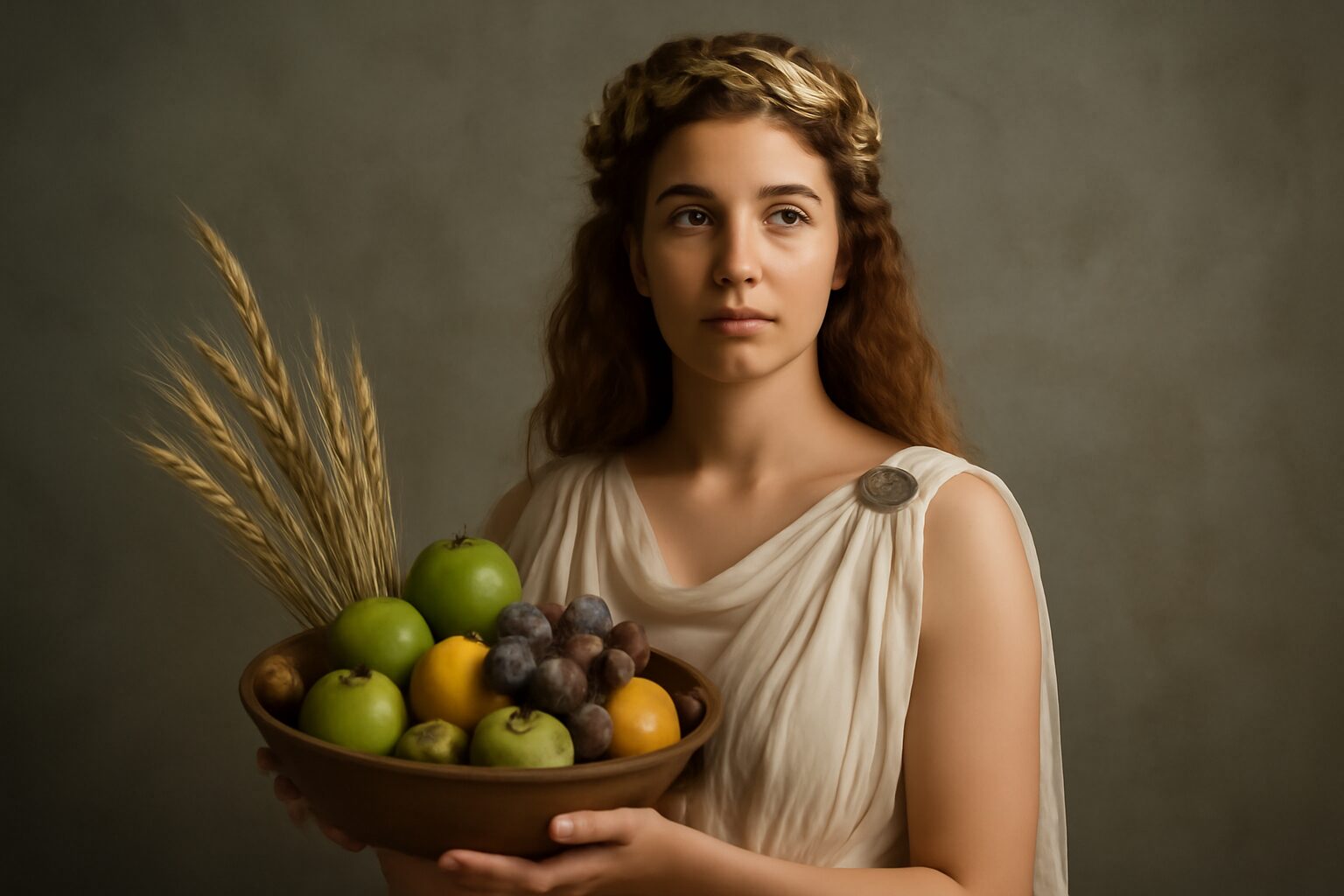Euthenia: The Greek Goddess of Prosperity and Abundance
In Greek mythology, Euthenia (Εὐθενία) was the lesser-known but significant goddess of prosperity, abundance, and well-being. Her name translates to "good fortune" or "plenty," reflecting her role in ensuring bountiful harvests, wealth, and a flourishing life for mortals. Often depicted as a graceful figure holding a cornucopia or surrounded by symbols of abundance, she embodied the blessings of a prosperous existence.
Mythology and Role
Euthenia was one of the Horae, the goddesses of the seasons and natural order, who were daughters of Zeus and Themis. While her sisters—such as Eunomia (Order) and Dike (Justice)—oversaw law and morality, Euthenia’s domain was the tangible rewards of a harmonious life: food, wealth, and comfort. She was closely associated with agricultural fertility, ensuring that fields yielded plentiful crops and communities thrived.
Though not as prominently featured in myths as Olympian deities, Euthenia was revered in daily life, particularly by farmers and merchants who depended on her favor. Her presence was a reminder that prosperity was not just material but a divine gift tied to virtue and balance.
Symbols and Worship
Euthenia was often depicted alongside symbols of abundance, such as the cornucopia (horn of plenty), sheaves of wheat, or overflowing baskets of fruit. In art, she appeared as a serene, youthful woman, sometimes accompanied by her Horae sisters or Demeter, the goddess of agriculture.
While no major temples were dedicated solely to her, Euthenia was honored in smaller shrines and during festivals celebrating harvests and prosperity. Offerings of first fruits, grains, and libations were made to invoke her blessings.
Relationships and Legacy
As a Horae, Euthenia was part of a divine triad that maintained cosmic and societal order. Her connection to Demeter and Dionysus—gods of agriculture and wine—highlighted her role in sustaining life’s essentials. Unlike gods of war or love, Euthenia’s influence was subtle but foundational, ensuring that communities had the resources to thrive.
Her legacy endures in modern interpretations of abundance and well-being, symbolizing the ancient Greek ideal that true prosperity comes from harmony with nature and the divine.
Alternative Names for Euthenia
God Name: Abundantia (Roman)
Abundantia is the Roman goddess of abundance and prosperity, often associated with Euthenia in Greek mythology. She symbolizes plenty and is depicted with a cornucopia.
God Name: Euthymia (Greek)
Euthymia is a lesser-known Greek name sometimes associated with Euthenia, representing a state of happiness and contentment, closely related to prosperity and well-being.
God Name: Ploutos (Greek)
Though primarily the god of wealth, Ploutos is sometimes linked to Euthenia in contexts where abundance and prosperity are emphasized, as both deities represent aspects of material and spiritual wealth.
Tales about Euthenia
Euthenia and Plutus: The Bounty of Prosperity
In the golden age of humanity, when fields were lush and harvests abundant, Euthenia walked the earth alongside Plutus, the god of wealth. Together, they visited a small village suffering from a harsh winter. Plutus, with his power over riches, offered the villagers gold and jewels, but they remained cold and hungry.
Euthenia, embodying prosperity and well-being, gently touched the soil. She whispered to the seeds, and soon, crops sprouted in vibrant greens and golds. She taught the people to store grain, build warm shelters, and share resources. Plutus watched in awe as true wealth manifested not in coins, but in full bellies and smiling faces. From that day, they worked in harmony, with Plutus providing material riches and Euthenia ensuring they were used to foster genuine abundance and comfort.
Euthenia and Demeter: The Gift of Sustenance
During a great famine, the goddess Demeter, in her sorrow, let the world wither. Crops failed, and despair spread. Euthenia, moved by the suffering, approached Demeter with a basket of the last ripe fruits and grains, preserved through her power of prosperity.
She spoke to Demeter of the joy in harvest festivals, the warmth of shared meals, and the hope that springs from well-nourished communities. Demeter, reminded of her purpose, allowed Euthenia to accompany her as they traveled from land to land. Euthenia blessed the soil with fertility, while Demeter ensured the growth was sustained. Together, they restored balance, teaching humanity that prosperity is not just in abundance, but in the wise and grateful use of nature’s gifts.
Frequently Asked Questions
Who is Euthenia in Greek mythology?
Euthenia is the Greek goddess or spirit (daimona) of prosperity, abundance, and good fortune. She personifies the concept of thriving and flourishing conditions.
What is the difference between a Greek god and a daimona?
Greek gods are major deities with significant myths and cults, while daimones (or daimones) are minor personifications, spirits, or forces representing abstract concepts like prosperity, health, or emotions.
Why was Euthenia important in ancient Greek culture?
Euthenia symbolized prosperity and well-being, which were highly valued in Greek society. Her presence represented ideal living conditions and was often invoked for blessings of abundance.
Are there any myths or stories about Euthenia?
Unlike major gods, Euthenia doesn't feature in prominent myths. She appears more as a symbolic personification, often depicted in art alongside other prosperity-related spirits like Ploutos (Wealth).
How does the concept of Euthenia relate to modern life?
The idea of Euthenia as flourishing prosperity remains relevant today, representing goals of economic stability, personal growth, and societal well-being that people still strive for.













